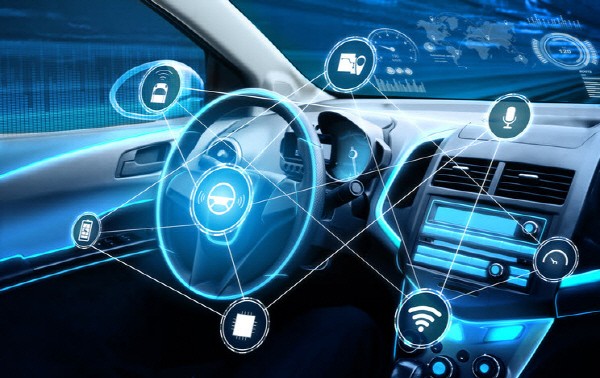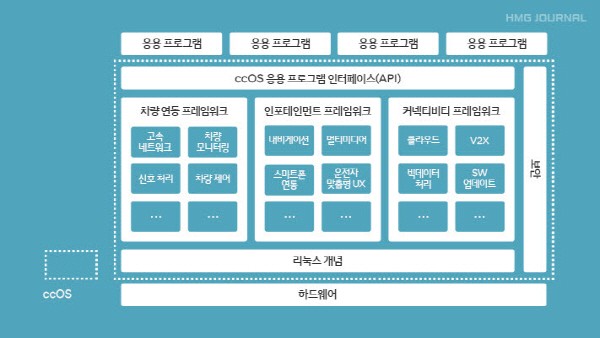Expansion of ‘Connected Car Operation System (ccOS)’ throughout the vehicles starting next year
Applied priorly to standard 6th generation Audio Video Navigation (AVN)

In order to take the lead in the automotive operating system (OS), the Hyundai Motor Group has completely split up with Google and is going on its own. It has been six years since Google's 'Android Automotive OS' (hereinafter referred to as Android OS) was applied to the infotainment system.
After applying its own OS to some models of Genesis last year for the first time, Hyundai Motor Company will expand to all models from next year, and reducing external dependence by 100%.The new OS is first applied to AVN for Hyundai Motor and Kia's standard 6th-generation.
It was confirmed on the 6th that Hyundai Motor Group chose the independently developed Linux-based ccOS for the standard 6th-generation AVN, which will be introduced next year.
After first introducing its own OS to infotainment, Hyundai Motor plans to expand its OS to its entire vehicles, such as instrument panel and vehicle control.
Currently, global automakers generally use different OSs in areas such as infotainment, instrument panel, and vehicle control. Although Volkswagen and Toyota applied their own OS to some parts of their vehicles before, Hyundai is the first to expand its OS to the entirety of its vehicles.
Following the high-end 6th generation AVN applied to the Genesis G80 and GV80, Hyundai Motor Group chose to switch to ccOS for the standard 6th generation AVN rather than mixing with Android OS. Starting with complete OS shift for 7th-generation Grandeur (GN7) of Hyundai Motor, it is planned to apply to all vehicles from Hyundai Motors and Kia Motors. The high-end AVN is supplied by LG Electronics, and the standard AVN is supplied by Hyundai Mobis.
ccOS is an OS specialized for connected cars, developed by Hyundai Motor Group for many years. It is operated by Nvidia's high-performance information processing semiconductor 'Nvidia Drive’. It has the ability to stabilize a car connectivity environment and process and execute massive amounts of data quickly.
The Android OS covers limited to infotainment, but ccOS can cover all systems of the vehicle. △'Infotainment Framework' that provides functions in navigation, multimedia, and driver-customized user experience (UX). △'Vehicle Interworking Framework' that provides functions in vehicle network and control. △'Connectivity framework' that provides data processing functions based on external connections. ccOS consists of these kind of frameworks.

Hyundai Motor Group applied ccOS to the 5th generation AVN at the end of 2016 for the first time, but there was no practical benefit in using Android OS, and urgently decided that ccOS needs to be developed in order to prepare for future car eras.
It seems that the company introduced ccOS to begin proactively in consideration of the reinforcement of security according to the implementation of vehicle-to-everything (V2X) and the implementation of 'over-the-air programming' (OTA) for electronic control devices. It is expected that the initial stage of introduction will apply the ccOS to only AVN and instrument panel, then expand the scope after confirming the OS stability.
An official from Hyundai Motor Company said, "The vehicle OS was not important prior, but as communication and application (app) environments diversified, a versatile OS was needed.""For this reason, Android OS was chosen. However, as Google’s lead has largely shifted, complete vehicle manufacturers are starting to develop their own OS again.”
The company is making plans to lead the OS after the Hyundai Motor Group splits up with Google.
Automakers have been very limited in implementing various functions for awhile, such as unilaterally following Google's policy and continuing to update OS according to Google’s demand. Another concern was that Google could collect data such as navigation and payment from AVN. In particular, it also has a negative effect on parts cost management since Google is directly involved in the hardware (HW) specifications to which its OS is applied.
There is no inconvenience for user experience seven if ccOS is introduced. Google's 'Android Auto' and ‘Apple Car Play' functions, which have high usage rates, are also supported by ccOS. In addition, the Android OS update will continue to be supported following Google’s policy for existing vehicles that use Android OS in order to minimize user inconvenience.
In this regard, a Hyundai Motor Group official said, “We plan to expand the application of ccOS from 2022. However, the specific date and model have not been confirmed.”
By Staff Reporter Jinhyung Park
(jin@etnews.com)